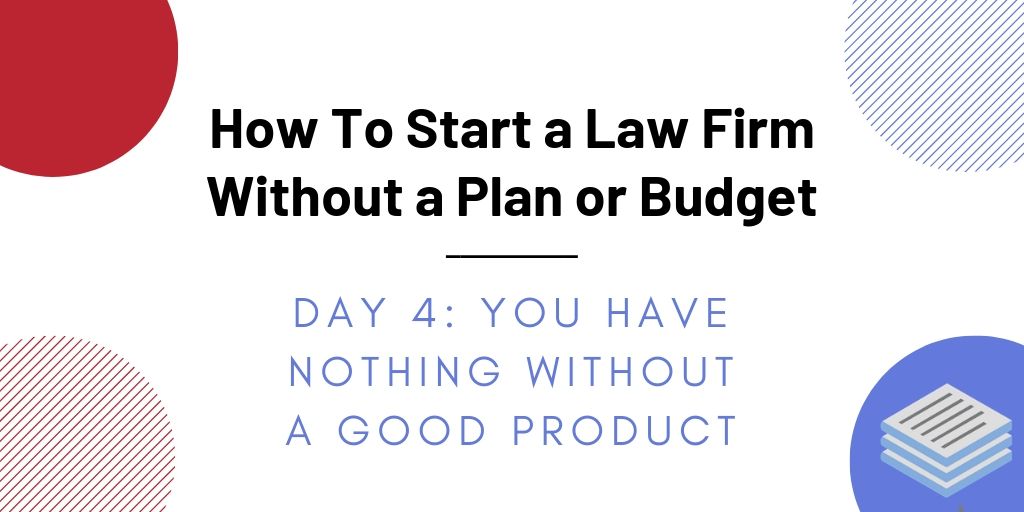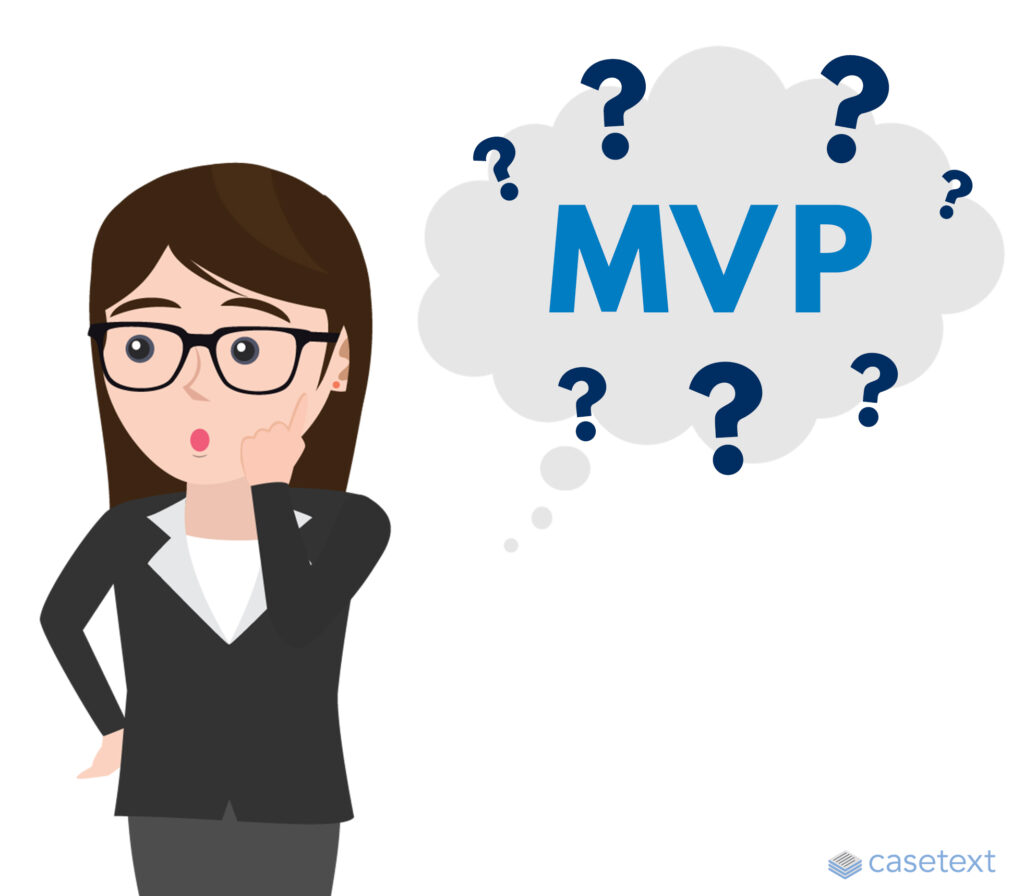
Today we address a problem: what worked for the bar exam won’t work for a case.
Up to now, your legal education has targeted a test. To really advise a client you’ll have to have a deeper knowledge of the substantive law than any of those tests required. You need a plan for getting there.
As an industry, we haven’t really answered the question of what lawyers sell. A universal definition of “lawyering” is the dream of legal regulators and business planners. We don’t need to solve that right now.
Right now, let’s assume that you’ll deliver legal services. That could be monetized through a contract, or a will, or a plea deal. In every case you’ll need a minimum amount of knowledge (or you’ll get sued and lose your license, which is bad).
Eric Reis in his book The Lean Startup talked about “Minimum Viable Product.” Many commentators on lean will focus on “minimum” and “product,” but you’re a lawyer. You need to focus on “viable.” How do you quickly get to a marketable level of expertise in whatever service you decide to offer?
So, you’ll need to find something to sell that you can deliver well. Pick something with a very limited scope, a service designed for common problems. I think you’d be surprised how little that takes in terms of time, but it requires deliberate practice.
One of my favorite quick sources of cashflow is court appointments. That’s not a great long-term solution, but becoming competent can happen fast. Most courts or local bar associations will offer introductory classes for lawyers who want to be on appointment lists. Usually those courses are free, and they’re fast.
After about a week of deep study, you’ll be competent to deliver an MVP. Don’t hold yourself out as the super genius lawyer that invented the practice area, just be a quality deliverer of a legal service. And then listen to feedback.
Getting back to the example we discussed yesterday, imagine you decided to deliver the best hot dog ever. When you focus on an amazing dog, buyers will let you know what other ingredients need improvement and how you might deliver it.
This feedback loop — which Reis calls “build, measure, learn” — liberates you from feeling like you have to know everything right now. You’re not a dumb, new lawyer. You simply have to limit the scope and be amazing at something important.
It is better to do one thing well than to do several things poorly. You need positive client reviews, and they aren’t impressed by the breadth of your surface knowledge; clients care about the depth of your knowledge related to their single issue. Serve them well.
Release yourself from the expectation of being Perry Mason today. If they did a Perry Mason prequel, Perry: the Younger Years, that show would be totally stupid. He became Perry. You’ll become you.
Let’s define your MVP. Strip down one type of case in a practice area you fancy and get really good at it. You can then sell that specific product, and nothing more.
In my own experience, I decided I would really get to know the rules surrounding an “uncontested divorce.” (Scare quotes intentional there.) I put in specific lines to define what kind of case qualified for this product and what didn’t. I could do a divorce with no children and property under $25,000 in my sleep within a month of opening my practice.
So, once you’ve picked a practice area to focus on, call a mentor. Ask him or her what the low-hanging fruit is in the area — what work is legally simple but most lawyers don’t like to do. Maybe it’s misdemeanors, or protective orders, or deceptive trade cases, or bicycle accidents. For the most part, these are not big money makers. But that’s fine. You need to know where to start. That’s your MVP.
Once you have your MVP, take a week and get to know the relevant law. Don’t just read the book, but write down how you handle the case, steps 1 through 100.
Write down the questions you need to ask the client in a pre-consultation questionnaire. Write down what filings you need to send to the court and how to do that. Put to paper what filings you should expect in return from the other side, and write down what options you have for dealing with the response. List the elements for each argument you might make in this particular case type and map out a decision tree to help pinpoint which arguments you’ll make. Figure out what documents you’ll need from clients to address the elements. Write it down.

If this requires a better practice guide than you have, visit a law library, or a mentor’s private stock of helpful books. Once you have your detailed, step-by-step document, pass it by your mentor. What have you forgotten? Add it. Get this product perfect. It’s all you’re selling right now.
How do you know if you’ve picked the appropriate case type? Well, if it takes more than a week to figure out, you’ve picked the wrong case type. So spend your week documenting a process you’ll master. You just need something to sell.
Relatedly, it’s time to address cashflow. We’ll start with the easiest path: court appointments.
Today you need to search out the president of your local bar association. When you find her, ask for guidance on what court appointment opportunities are available in your county.
My county had appointments for guardians in probate, attorneys ad litem in child protection cases, defense counsel in criminal filings, and receivers in real estate litigation, to name a few. No doubt your county or a surrounding county has similar opportunities.
Ask the bar president which lists have the most need, and ask for suggestions for attorneys that might give some input on each list. Ask which court is responsible for each list and whether they have any issues paying attorneys. Once you figure out where the need is and where your interests lie, you can plot out your self-education course. We’ll discuss that tomorrow.
And while you’re at it, ask the bar president out to lunch. More on that later, too.
Go on to the next chapter: Your Self-Education System
Or, go back to the Table of Contents
Rapidly draft common legal letters and emails.
How this skill works
Specify the recipient, topic, and tone of the correspondence you want.
CoCounsel will produce a draft.
Chat back and forth with CoCounsel to edit the draft.
Get answers to your research questions, with explanations and supporting sources.
How this skill works
Enter a question or issue, along with relevant facts such as jurisdiction, area of law, etc.
CoCounsel will retrieve relevant legal resources and provide an answer with explanation and supporting sources.
Behind the scenes, Conduct Research generates multiple queries using keyword search, terms and connectors, boolean, and Parallel Search to identify the on-point case law, statutes, and regulations, reads and analyzes the search results, and outputs a summary of its findings (i.e. an answer to the question), along with the supporting sources and applicable excerpts.
Get answers to your research questions, with explanations and supporting sources.
How this skill works
Enter a question or issue, along with relevant facts such as jurisdiction, area of law, etc.
CoCounsel will retrieve relevant legal resources and provide an answer with explanation and supporting sources.
Behind the scenes, Conduct Research generates multiple queries using keyword search, terms and connectors, boolean, and Parallel Search to identify the on-point case law, statutes, and regulations, reads and analyzes the search results, and outputs a summary of its findings (i.e. an answer to the question), along with the supporting sources and applicable excerpts.
Get a thorough deposition outline in no time, just by describing the deponent and what’s at issue.
How this skill works
Describe the deponent and what’s at issue in the case, and CoCounsel identifies multiple highly relevant topics to address in the deposition and drafts questions for each topic.
Refine topics by including specific areas of interest and get a thorough deposition outline.
Ask questions of contracts that are analyzed in a line-by-line review
How this skill works
Allows the user to upload a set of contracts and a set of questions
This skill will provide an answer to those questions for each contract, or, if the question is not relevant to the contract, provide that information as well
Upload up to 10 contracts at once
Ask up to 10 questions of each contract
Relevant results will hyperlink to identified passages in the corresponding contract
Get a list of all parts of a set of contracts that don’t comply with a set of policies.
How this skill works
Upload a set of contracts and then describe a policy or set of policies that the contracts should comply with, e.g. "contracts must contain a right to injunctive relief, not merely the right to seek injunctive relief."
CoCounsel will review your contracts and identify any contractual clauses relevant to the policy or policies you specified.
If there is any conflict between a contractual clause and a policy you described, CoCounsel will recommend a revised clause that complies with the relevant policy. It will also identify the risks presented by a clause that does not conform to the policy you described.
Get an overview of any document in straightforward, everyday language.
How this skill works
Upload a document–e.g. a legal memorandum, judicial opinion, or contract.
CoCounsel will summarize the document using everyday terminology.
Find all instances of relevant information in a database of documents.
How this skill works
Select a database and describe what you're looking for in detail, such as templates and precedents to use as a starting point for drafting documents, or specific clauses and provisions you'd like to include in new documents you're working on.
CoCounsel identifies and delivers every instance of what you're searching for, citing sources in the database for each instance.
Behind the scenes, CoCounsel generates multiple queries using keyword search, terms and connectors, boolean, and Parallel Search to identifiy the on-point passages from every document in the database, reads and analyzes the search results, and outputs a summary of its findings (i.e. an answer to the question), citing applicable excerpts in specific documents.
Get a list of all parts of a set of contracts that don’t comply with a set of policies.
Ask questions of contracts that are analyzed in a line-by-line review
Get a thorough deposition outline by describing the deponent and what’s at issue.
Get answers to your research questions, with explanations and supporting sources.